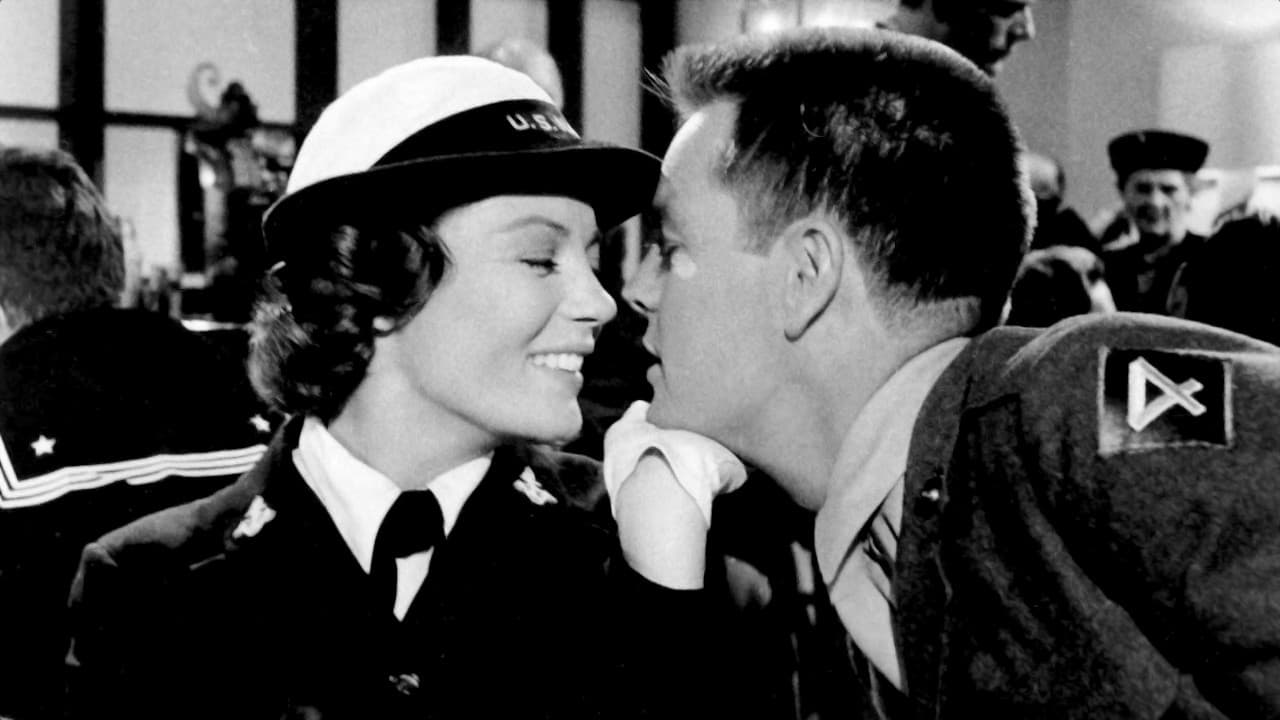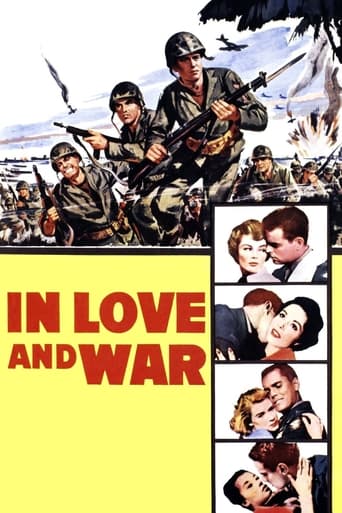

One of the best films i have seen
... View MoreIf you like to be scared, if you like to laugh, and if you like to learn a thing or two at the movies, this absolutely cannot be missed.
... View MoreThe movie turns out to be a little better than the average. Starting from a romantic formula often seen in the cinema, it ends in the most predictable (and somewhat bland) way.
... View MoreOne of the most extraordinary films you will see this year. Take that as you want.
... View MoreAnton Myrer was a very good writer, smooth, palatable. But I'm not sure about Edwar Anhalt's commercially oriented adaptation. Three Marines visit their San Francisco homes in 1944 and face the kinds of familial and romantic problems that were found in "Payton Place" and so many other stories of the 1940s and 50s. Everything is spelled out at once, as in a brief television advertisement. Jeffrey Hunter is an experienced gunnery sergeant. His Greek family loves him but his problem is that his girl friend, Hope Lange, is now preggers. I particularly like Hope Lange. She was pretty in a wholesome, wistful way. I may have patronized her family's restaurant in Greenwich Village in the 50s and she was my costar in David Lynch's "Blue Velvet." Robert Wagner is the cocky young Irish enlistee from the slums, also my costar in the unforgettable mini series whose title I've forgotten. (You ought to see what San Francisco considers a slum; in my neighborhood that would have been in the middle range of the middle class.) His problem is that he drinks too much and his step father constantly insults him. Then there's Bradford Dillman, a native San Franciscan actually, who is the well-educated rich kid engaged to the willful drunk, the self-described "rich tramp", Dana Wynters. He's also got a thing going with the very attractive France Nuyen but that's headed nowhere, this being the 1940 and Nuyen being a person of color, even though it's a very attractive color. I sobbed like a child through all this exposition.Next, the three men wind up in the same hotel. Hunter takes his new wife to the honeymoon suite and as the lights go out and they embrace, she whispers, "This is the first time. The baby came from the first time." (I'd always thought you were entitled to only one first time.) Meanwhile Robert Wagner is courting his old girl friend, Sheree North, who has become a WAVE in his absence. A third-class yeoman, she outranks him but this doesn't bother either of them. Wagner gets loud and drunk, as expected, and when he starts a fight or passes out we're expected to be amused. In Hawaii, Dillman also gets a thing going with the very attractive France Nuyen but that's headed nowhere, this being the 1940s and Nuyen being a person of color, even though it's a very attractive color. Dillman, by the way, is an interesting actor: prep school, Yale, the Marine Corps. And when he speaks, the intonations conjure up the ghost of Charlton Heston. The men remain as before: one grown-up Greek; one boisterous Irish drunk; one polite but confused aristocrat. All of this trite exploration of characters and their conundrums, accompanied by a lush, fulsome romantic theme, takes up the entire first half of the movie. They all argue passionately about one thing or another, until the viewer gets the impression that the battlefield might be a relief. All the girls yield. All the men score. And, yes, I was racked by tears throughout.Finally the men depart for landings in the Pacific. "God. Damn war," says France Nuyen as they sail. "God" and "damn" are two separate words. I don't think "God damned" was quite acceptable at the time. As the landing craft approach the erupting beach of an unnamed island, we meet Mort Sahl, a now mostly forgotten comic of the 50s, who at least introduces some necessary humor. Reading from one of those "Know Your Enemy" books, he announces, "Remember, if you are captured give them nothing but your name, rank, and the exact position of your unit. What would they want with your serial number?" There follows some combat footage and some reasonably well-done enactments. The cocky Irish kid is humbled by a fit of cowardice. Dillman breaks down with dengue fever. Hunter is already suffering from malaria.But enough about the Marines and their tsuris. The film, as if undergoing withdrawal, twitches and flips in spasmodic fits back to pointless scenes of the girls in San Francisco. You will not be surprised that Hunter's wife, Hope Lange, meets her husband's Greek family for the first time, and she and the baby are greeted with ebullience. Nor will you be surprised to learn that Dana Wynter, the "rich tramp," has slit her wrists and wound up in the hospital where she is treated by -- get this -- France Nuyen, her ex boyfriend's new girl friend, who happens to be a nurse. Dana Wynter wakes up in a state of anguish and full make up and begins babbling to Nuyen, who is a complete stranger to her. "I didn't mean to do it. I need HELP!" She expires with a piercing shriek. Nuyen is compelled to look away sadly, but surely she, a grown woman, must realize that with the departure of Wynter, there is no one else left for Dillman, the very wealthy aristocrat, to come home to. She wastes no time before visiting Dillman's rich family, the family with the butler. By this time the tears had stopped and I was dissolved in laughter.The battle is well-done and the final scenes of the returning men are moving, but what can redeem that soap opera? Dynasties rose and fell, geological epochs came and went, while we watched young men and women wrestle with emotional problems so familiar and predictable that they might have come directly from Screen writing For Dummies. I'm sure that Myrer's novel was better.
... View MoreThe story follows three marines, and their girls, from home leave to combat in the Pacific.The movie's very much a mixed package. With a couple exceptions, war films of the 1950's shied away from combat realism, whose trauma might easily overwhelm audiences. The second half of this war film does a pretty good job portraying the so-called fog of war, along with perfectly natural emotional and physical reactions to combat death. These scenes are done on exterior sets and are uglified to maximal extent. Such grim scenes are then intercut with sunny scenes in San Francisco, done in glowing candy box colors. The resulting contrast is appropriately jolting, to say the least, and leaves no doubt that between "love" and "war", which is to be preferred.The trouble lies with a swollen narrative that is too conventional in the "Love" part. It also shows what happens when a big studio, TCF, decides to promote a younger cast into possible stardom. Everybody—about the top seven in the cast list—gets cameo screen time, in the film's first half, especially. This draws out the runtime, and coupled with a conventional script, tends to drag out the first part, long after we've gotten the idea. The actors perform well enough, though O'Neill's (Wagner) drunken binge is over the top, maybe the only time in the actor's generally restrained career. Note, in passing, the post-war symbolism of pairing Newcombe (Dillman) with Kalai (Nuyen).All in all, the movie's a good look at how Hollywood shaped WWII to commercial needs of the big screen. But is otherwise forgettable.
... View MoreAnton Myrer's novel, "The Big War," was published in 1957 with some degree of success and, not surprisingly, 20th Century-Fox bought the film rights. After all, World War II movies were a staple of this time and Myrer's novel provided a number of parts for those rising young performers then being groomed by 20th. The novel's three central Marine characters remained in Edward Anhalt's screenplay but their backgrounds were simplified, various supporting characters were eliminated, and the background for the domestic scenes shifted from the East Coast to California. Robert Wagner's back-story remains truest to the book. He has a doting mother and adoring younger siblings but fights with his hateful step-father. Bradford Dillman plays the rich, college-educated Marine and the movie sketches in his background but now gives him a drunken socialite of a fiancée, Dana Wynter, who's largely a screenwriter's invention. (His new girlfriend, France Nuyen, seems to have been inspired by another, unrelated character in the book.) Dillman's fate has also been re-written from Myrer's version. Jeffrey Hunter plays the conscientious Marine with the pregnant wife but his strained relationship with his mother-in-law goes unmentioned in the movie. (He does, however, get a bare-chest scene.) The second half of the movie shifts from homefront scenes in California to battle scenes in the Pacific. These scenes are done in a perfunctory style -- laced with occasional footage from actual World War II photographers -- and the actors' identities sometimes blur in those similar uniforms and under those metallic helmets. The result of all this is a glossy, mildly entertaining, but unmemorable movie which never rises above the "B" level of its "B" level performers. (Acting honors, such as they are, go to Sheree North as a practical-minded WAC.)
... View MoreAlthough made in 1958, this is one of those patriotic WWII movies that are a hit with Americans who appreciate the sacrifices made for our freedom. Yet, there was plenty of home front footage as well with very good acting. Dana Wynter, whom I had just seen in Sink The Bismarck, did a wonderful job in a difficult part. The writing for the part was superficial and the reasoning behind it not believable. And yet, Ms. Wynter took it and made it believable. What an actress! And darn good looking too! The male leads were all well done, Jeffrey Hunter, Robert Wagner and Bradford Dillman. One finds oneself rooting for all three Marines to make it through the battle scenes. Hope Lange, a great actress as always and a real beauty. Remember her in the TV version of The Ghost and Mrs. Muir? France Nuyen, a sweet face and good acting, what more could we want? One face popped up that I recognized right away - a Corcoran boy! This one is Brian who played Israel Boone on the old Daniel Boone TV show. But it was his brother Kevin Corcoran whom I thought about - the great child actor who did Old Yeller, Pollyanna and others. His sister in the movie is Veronica Cartwright, the real life sister of Angela Cartwright of the Danny Thomas show, Lost in Space and Brigitta in the Sound of Music movie. Of course Veronica made news herself as Jimima Boone on the same TV show as Brian, Lumpy's sister on Leave It To Beaver, Spencer's Mountain and other good parts. All in all, excellent acting in this movie, good drama and exciting WWII action by the Marines. Well worth seeing.
... View More